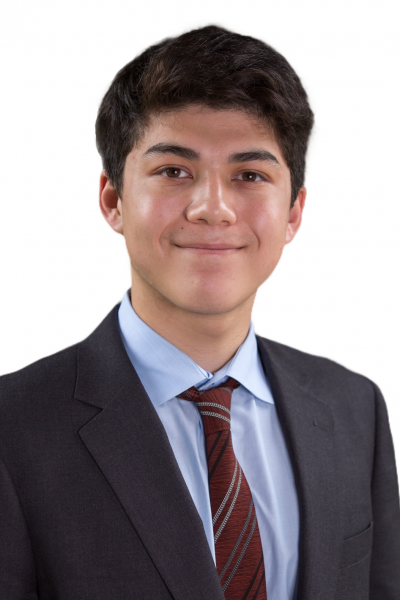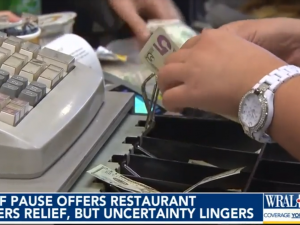Q&A with DFE Leadership Award Winner Noah Karpel ’21

At the end of every spring semester, the Duke Financial Economics Center (DFE) selects seniors to receive the DFE Leadership Award, which honors students’ initiative in finance-related activities and dedication to mentorship. The 2020-2021 recipients of the DFE Leadership Award are Itamar Barak, Noah Karpel, Eric Little, and Hannah O’Sullivan.
Despite the challenges of the 2020-2021 academic year, these seniors continued to step up, making themselves available to younger students for advising, organizing events to help their fellow students stay engaged, and rounding out their Duke experiences with other activities that ignited their passions.
We are featuring the recipients in a series of Q&A profiles. In this installment, computer science and classical civilizations double major Noah Karpel talks about his journey pursuing finance and his other diverse interests at Duke. After graduation, he is headed to Bank of America Merrill Lynch as an investment banking analyst.
Professor Emma Rasiel, DFE teaching director, says about Noah, “as a TA for Econ 256 Practical Financial Markets, in a semester where everything was online, he was tireless in providing office hours for sophomores, as well as helping John [John Caccavale, DFE executive director] and me adapt their materials for a virtual setting. He is someone who, if anyone asks for help, immediately puts up his hand.”
How did your interest in finance develop?
I developed an interest in finance through various networking events and panels facilitated by DFE that brought finance professionals to campus to reflect on their professions and personal paths to growth. These events were thoughtfully constructed and organized in ways that set them apart for me from other campus programs. They inspired me to join the Investment Club and to participate in finance-related events and competitions.
How did you become involved with DFE?
I became involved with DFE by taking Econ 256 Practical Financial Markets as a sophomore. This class, taught by Professors Rasiel and Caccavale, pushed me to significantly expand my subject matter aptitude and to apply my newly acquired learning through spirited competitions sponsored by DFE and major banks. My classwork and extracurricular participation in DFE helped facilitate the building of relationships with finance professionals and with Professor Rasiel.
What events, programs, classes, and people have had the most impact on you as you’ve pursued finance? In what ways have they helped you grow?
I would say that Econ 256 has had the most impact on me as I’ve explored finance at Duke. It pushed me to build relationships with finance-oriented students in my class through teamwork in case study competitions and in finance-related extracurriculars like the Investment Club. Further, it helped me to establish relationships with finance professionals, making me aware of mentorship programs and networking events on campus. Later, as a teaching assistant for Econ 256, I was able to pay it forward, providing assistance to other finance-oriented students and offering mentorship in my office hours.
Of all of the contributions you’ve made through finance-related activities (both DFE and non-DFE), of what are you the proudest?
I am the most proud of my work as a teaching assistant for Econ 256 and my involvement in the Investment Training Program (run by the Investment Club). This has allowed me to bond with students in other classes who are interested in finance through the office hours sessions that I’ve hosted and to enjoy firsthand the thrill of seeing light bulbs go on for other students who have just begun down this path. And, for good measure, I have been able to host my office hours sessions on the application, Woto, which I helped develop with a few close friends at Duke.
Outside of finance, what other interests have you explored at Duke? What non-finance accomplishments are you proud of?
Outside of finance, I am proud of the work that I have done in my qualitative studies at Duke. I am finishing up a thesis for my classical civilizations major that focuses on the intersectional identity of Judaeans in the Late Ptolemaic and Early Roman Period in Alexandria, Egypt. It has been a year of intense research, writing, and communication with my thesis advisor and past classics professors both at Duke and in Edinburgh, where I also studied for a semester. I have also tremendously enjoyed my involvement in the arts at Duke: I am an associate editor for and contributor to the comedic publication, Duke Department Of; I have been writing, producing, editing, and acting in a short-film that I intend to submit to the Duke Independent Film Festival (fingers crossed on a nomination); and, for the very first time, I have just acted in a live performance as part of the Duke Asian American Theater.
What advice would you give first-years and sophomores, in terms of pursuing finance and in general? What advice would you give students who will be juniors and seniors in the fall?
Any other comments you’d like to share?
I would like to offer heartfelt thanks to Professor Rasiel who has generously provided me advice and mentorship throughout my tenure at Duke.




